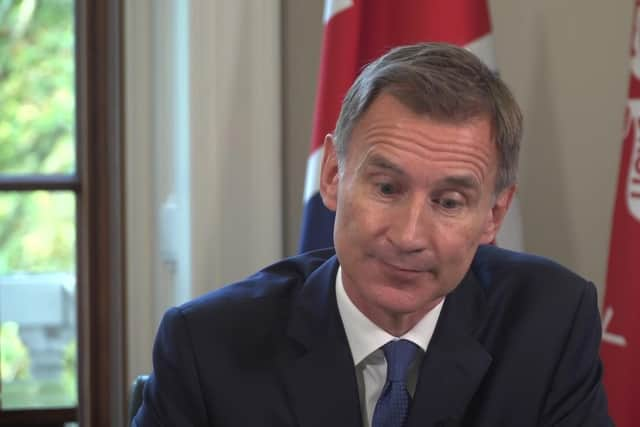What did the Chancellor announce and what does this mean for Yorkshire?
The new Chancellor has ditched almost all the measures of last month’s fiscal statement agreed between the Prime Minister and Kwasi Kwarteng following the impact on mortgages and pension funds which forced the Bank of England to intervene numerous times this month.
Mr Hunt will set out full details in Parliament later today, but announced this morning that, in addition to the already-dropped tax cuts to corporation tax and the high rate of income tax, further measures in the Government’s Growth Plan will not be carried forward.
Advertisement
Hide AdAdvertisement
Hide AdThe Chancellor’s economic plan has now removed the intention to cut the basic rate of income tax to 19p, and said that it will remain unchanged at 20p “indefinitely”.


Furthermore, planned tax cuts to alcohol duty will also be shelved, with Emma McClarkin, the Chief Executive of the British Beer and Pub Association saying that this was “a huge blow to brewers and pubs” and essentially robs the industry of £300 million in savings for landlords already struggling to pay their bills.
The largest cost to the taxpayer and government borrowing comes from its energy bailout package to businesses and households.
The freeze on household energy bills was due to last for two years. The Chancellor now says that this will only last for six months, after which it will only be given to those who need it the most, and will conduct a review to establish who needs targeted support.
Advertisement
Hide AdAdvertisement
Hide AdThe Resolution Foundation think tank said that the reversal of 60 per cent of the mini-budget’s tax cuts will now see the typical household lose around £1,000 due to personal tax cuts and benefit changes, some £220 more than when the fiscal plan was announced.
This now brings the UK’s tax rate to its highest level since 1950.
Bringing the Energy Price Guarantee to an end in April, 18 months earlier than planned could save the Treasury £40 billion, but would allow the energy price cap to rise to £4,000 for households from next year, a price many cannot afford.
“The cost of doing business is completely out of control for pubs and brewers and the failure to act today to reduce pressures on businesses will hit them extremely hard,” she added.
Advertisement
Hide AdAdvertisement
Hide AdIn addition to this, the Chancellor warned that there will be further announcements, which may include further tax rises and cuts to public spending to balance the books.
“There will be more difficult decisions to take on both tax and spending as we deliver our commitment to get debt falling as a share of the economy over the medium term,” Mr Hunt said during his statement.
“All departments will need to redouble their efforts to find savings, and some areas of spending will need to be cut.”
Downing Street today insisted that this would not look like the austerity measures introduced by George Osborne in 2010.
Advertisement
Hide AdAdvertisement
Hide AdThe Prime Minister’s official spokesperson confirmed that some measures of the mini-budget will be remaining, but it is unclear whether they will be ditched in the future.
The plan for investment zones, which would bring lower taxes and other incentives for businesses in areas to boost growth, will remain.
Downing Street today dismissed suggestions that these would have to be scaled back, due to previous concerns that dozens of investment zones could be a liability to the Treasury as they see falling tax receipts from businesses.
Furthermore, when pressed on whether further cuts to public spending would see infrastructure projects scaled back or scrapped, such as Liz Truss’ commitment to Northern Powerhouse Rail, the Prime Minister’s official spokesman said that he was not aware that plans had changed for these projects.
Advertisement
Hide AdAdvertisement
Hide AdThe IPPR North think tank said although the Government is reversing many of its plans, “they’re not clear on whether they can stick to the basics”.
“Promises like the delivery of Northern Powerhouse Rail in full, and investment in our vital public services must not be rolled back. This would be devastating to communities across the North and totally undermine the UK economy.
“This is the moment for clarity, stability and shoring up commitments that protect the most vulnerable, across the whole country, whilst the wealthiest should step up – we are yet to see such assurances”.
It is also understood that its supply-side reforms - the eight reforms which include immigration and employment rights - are also due to still be set out by the Government in the run-up to the Chancellor’s medium term fiscal plan at the end of the month.
Advertisement
Hide AdAdvertisement
Hide AdRachel Reeves MP, Labour’s shadow chancellor, responding to the Chancellor’s statement, said: “The damage has been done. This is a Tory crisis made in Downing Street, paid for by working people, paying higher mortgage and borrowing costs.
“The Conservatives have lost all credibility. The Chancellor said that growth requires ‘confidence and stability’ yet it’s clear that the Tories can’t provide this. There will continue to be a huge cost to families because of the actions of this Tory government.
“We are still flying blind with no OBR forecasts and no clarity of the impact of their mistakes.
“The humiliating climb-down on their energy plan begs the question yet again – why won’t they bring in a windfall tax on energy producers to help foot the bill?
“Only Labour offers the leadership and ideas Britain needs to fix the economy and get out of this mess.”